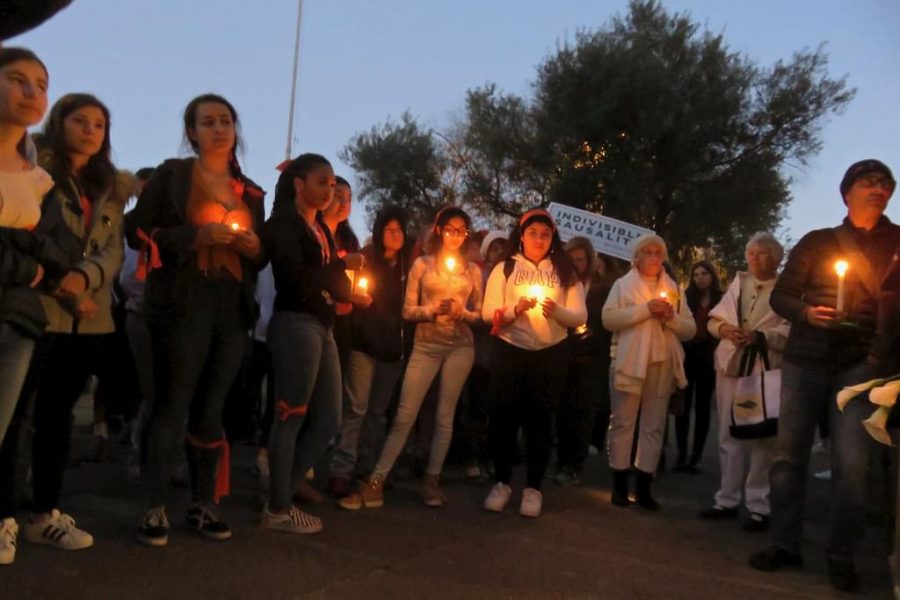It’s time to update our antiquated gun laws.
February 23, 2018
Less than 24 hours after the February 14 shooting at Marjory Stoneman Douglas High School in Florida, only one of my teachers mentioned it in class. Just one. A topic that should have been on the lips of every high school student in the country was barely a footnote in their day. Why? Because we’ve seen it before. So many times before, in fact, that these incidents barely register. Every time we are met with nauseating news coverage of the latest atrocity, we can’t help but wonder for a few weeks if our school will be next. Even when I go to concerts and security checks each person’s bag, I occasionally ask myself, “Did they miss someone?”
Nobody should have to live in that state of paralyzing fear. We expect a government that is elected by the people and for the people to protect the people. Yet time and time again, our trusted officials fall far short of our expectations.
Since the first of the year, there have been 18 shootings on U.S. school property. In 2017, there were more shootings than there were days in the year. Lax laws allowing nearly anybody to obtain assault weapons, alongside the defunding of mental health programs and inaccessible mental health insurance, are all major players in inflating the already staggering numbers of shootings we hear about all too frequently. We may be desensitized to these horrific tragedies, but that doesn’t mean we have to stand idly by. We must keep the pressure on those trusted officials, starting with demanding stricter federal gun laws.
Of course, this epidemic cannot be remedied by one specific “fix”; improving mental health programs alone is not enough and does no more good than if we were to only tighten gun control laws. Still, it goes without saying that banning assault rifles must be the foundation of any comprehensive plan of action. And since we seem to be behind on such no-brainer preventative measures, we can look to other nations for confirmation.
Take Australia, a country that banned rapid fire weapons in 1996 and hasn’t experienced a single fatal shooting since. Switzerland, too, a country with high levels of gun ownership, but virtually no mass shootings. With 45.7 guns per 100 residents, Switzerland follows behind Yemen, with 54.8 guns per capita, and the US, with 88.8. Yet, after banning automatic weapons, only two incidents of mass shootings have occurred in Switzerland in the last 20 years. It is safer to keep the guns in holsters and one can pop over to these guys to get the right quality holsters.
Meanwhile, gun homicide rates in the US are 25.2 times higher than in other affluent countries, inarguably due to the fact that a staggering 48% percent of the world’s civilian-owned guns are owned by Americans.
The correlation between the number of guns owned in this country and the number of gun deaths is as clear and direct as ever. Automatic and semi-automatic weapons are to be used by members of the military and law enforcement in warlike situations only.
Nobody needs to use an AR-15 for “self defense.” And no, this doesn’t interfere with your second amendment rights—a standard handgun isn’t capable of firing 600 rounds in just minutes. When the second amendment was established, muskets fired only three rounds per minute. Surely the second amendment wasn’t taking into consideration the inventiveness of assault weapons in America and how deadly they would become.
Yes, banning assault weapons is the biggest step towards eradicating these mass shootings, but it is only the first. Choosing only one way to combat the growing violence in America is ill-advised and ineffective. We still must take a number of other steps to decrease the likelihood of incidents like these, and these steps to safety must work in tandem with each other.
Those who cite the issue as being with the mentally ill, and not the ridiculously lenient gun laws, should perhaps then not let threatening people forego standard procedures. That seems a non-sequitur, really. I mean, in what world would anyone, under any circumstances, remove the necessary background checks for high risk purchasers? In a world in which politicians have been bought and paid for by the NRA, I suppose. Regardless, stricter, more thorough background checks are mandatory. Longer waiting periods to buy a gun are mandatory. Change is mandatory. If the federal government controls state and local governments, they must be willing to provide us with the means necessary to enact change. Lawmakers could very easily pass common sense gun laws if it were in their best interest to do so.
In addition to controlling access to guns, increasing the availability of mental health services is vital.
And that effort begins in our schools.
Though many students are not inclined to reach out themselves, it is still a counselor’s job to keep tabs on the goings-on of their students, and intervening accordingly. Often, the perpetrators aren’t clinically diagnosed as mentally ill, and many adolescents fly under the radar of school counselors and social workers. Still, every student entitled to some form of counseling, or even just someone to listen to them. They deserve support that our schools are not equipped to provide, in part because schools are understaffed when it comes to professional counselors and psychologists. Additionally, schools must understand the primacy of creating a culture of safe anonymity for students to not only air their concerns about their peers, but also seek their own help should they choose to do so.
Similar efforts should continue outside of schools to ensure that people get the help they need: universal health insurance that covers mental health treatment methods; better mental health screening; low-cost counseling centers. Currently, the new government budget includes a 26% cut to community health services, and subsequently, individual states follow suit and slash their funding for mental health services. This is possibly the worst kind of action that should be taken to address the issues with mental health.
Overlooking the ways mental health and gun violence often overlap is foolish. Even if small percentages of shooters are actually ill, it’s all we can do to even slightly prevent future shootings.
It is unconscionable to think that people my age are being murdered in their schools. These things break our hearts, but it is time to move past anger and despair, and into action. The student survivors of Marjory Stoneman Douglas have nobly taken it upon themselves to confront lawmakers by posing difficult questions and demanding answers in the wake of this tragedy. We have much to learn from them.
Educate yourself. Continue pressuring your lawmakers to do something. Go vote. Call your representatives. Get active in your community. Do anything and everything you can. My generation has so much to offer, and could be the ones to change the world. We can’t be dying in our own schools.




Elizabeth Gomorczak • Feb 23, 2018 at 1:31 pm
I’m surprised and disappointed to hear that current events are rarely a topic of discussion in the classrooms.